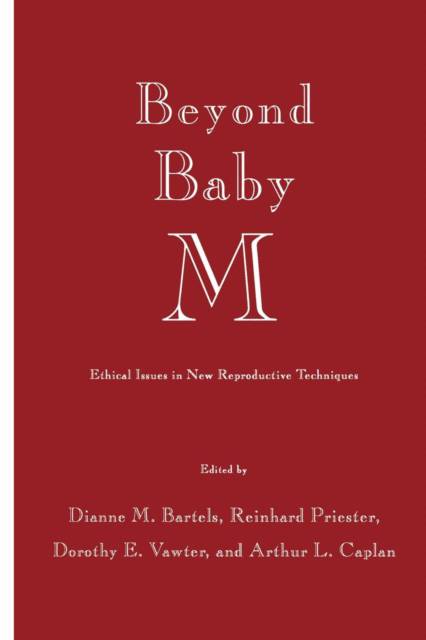
Je cadeautjes zeker op tijd in huis hebben voor de feestdagen? Kom langs in onze winkels en vind het perfecte geschenk!
- Afhalen na 1 uur in een winkel met voorraad
- Gratis thuislevering in België vanaf € 30
- Ruim aanbod met 7 miljoen producten
Je cadeautjes zeker op tijd in huis hebben voor de feestdagen? Kom langs in onze winkels en vind het perfecte geschenk!
- Afhalen na 1 uur in een winkel met voorraad
- Gratis thuislevering in België vanaf € 30
- Ruim aanbod met 7 miljoen producten
Zoeken
Beyond Baby M
Ethical Issues in New Reproductive Techniques
Dianne M Bartels, Reinhard Priester, Dorothy E Vawter, Arthur L Caplan
€ 106,95
+ 213 punten
Uitvoering
Omschrijving
Arthur L. Caplan It is commonly said, especially when the subject is assisted reproduction, that medical technology has out- stripped our morality. Yet, as the essays in this volume make clear, that is not an accurate assessment of the situ- ation. Medical technology has not overwhelmed our moral- ity. It would be more accurate to say that our society has not yet achieved consensus about the complex ethical iss- ues that arise when medicine tries to assist those who seek its services in order to reproduce. Nevertheless, there is no shortage of ethical opinion about what we ought to do with respect to the use of surrogate mothers, in vitro fertil- ization, embryo transfer, artificial insemination, or fertil- ity drugs. Nor is it entirely accurate to describe assisted repro- duction as technology. The term "technology" carries with it connotations of machines buzzing and technicians scurrying about trying to control a vast array of equip- ment. Yet, most of the methods used to assist reproduc- tion that are discussed in this volume do not involve exotic technologies or complicated hardware. It is technique, more than technology, that dominates the field of assisted reproduction. Efforts to help the infertile by means of the manipu- lation of human reproductive materials and organs date 1 2 Caplan back at least to Biblical times. Human beings have en- gaged in all manner of sexual practices and manipulations in attempts to achieve reproduction when nature has balked at allowing life to begin.
Specificaties
Betrokkenen
- Auteur(s):
- Uitgeverij:
Inhoud
- Aantal bladzijden:
- 288
- Taal:
- Engels
- Reeks:
Eigenschappen
- Productcode (EAN):
- 9781461288534
- Verschijningsdatum:
- 20/05/2013
- Uitvoering:
- Paperback
- Formaat:
- Trade paperback (VS)
- Afmetingen:
- 156 mm x 234 mm
- Gewicht:
- 421 g

Alleen bij Standaard Boekhandel
+ 213 punten op je klantenkaart van Standaard Boekhandel
Beoordelingen
We publiceren alleen reviews die voldoen aan de voorwaarden voor reviews. Bekijk onze voorwaarden voor reviews.









